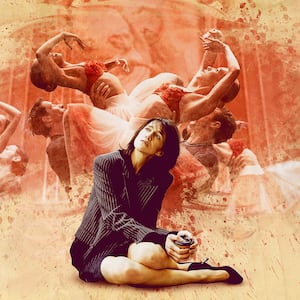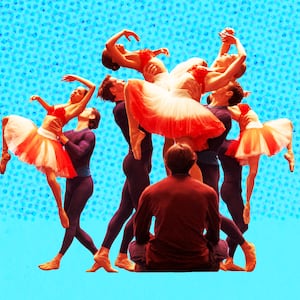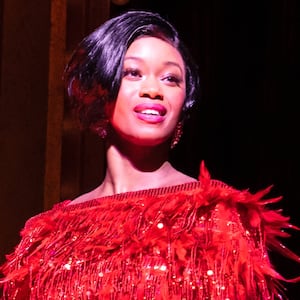(Warning: Spoilers ahead.)
Dance doubles as a flirtation and even foreplay in the highly competitive Étoile setting, proving Paris and New York are both cities for lovers.
After swapping talent between the prestigious (and fictitious) French and American ballet institutions sparks new and old connections, the first season culminates in two defining dances, a swoony, rom-com-worthy public declaration, and an intimate pas de deux in a dark studio. If this were a competition, then the intricate steps and horny moves would get 10s across the board.
Fans of Amy Sherman-Palladino shows like Gilmore Girls and The Marvelous Mrs. Maisel are accustomed to snappy dialogue and big personality sparring that spills over into the bedroom. Étoile (that’s French for “star”) continues this hallowed tradition, but without making viewers wait several seasons to consummate feelings: Yearning is great, kissing is better. The season finale certainly proves that.
Members from both companies share a passion for this art form—and for each other. New York City’s Metropolitan Ballet Theater director, Jack (Luke Kirby), and his French counterpart, Geneviève (Charlotte Gainsbourg), have a history that repeats itself by Episode 5. It takes longer to confirm that Jack and star ballerina Cheyenne (Lou de Laâge) have seen each other naked, even though neither has issues speaking their minds (hell, Cheyenne has a whole conversation with Jack’s crotch).

Jack’s exploits are endlessly entertaining, and Kirby’s chemistry with de Laâge and Gainsbourg crackles without retreading the same beats shared with Mrs. Maisel co-star Rachel Brosnahan. Even with Jack and Cheyenne’s long-awaited reignited passion, another burgeoning couple pulls focus for most of the finale.
Neurotic American choreographer Tobias (Gideon Glick) struggles after relocating from New York, but finds inspiration from Le Ballet National’s resident bad boy, Gabin (Ivan du Pontavice). It is in the beginnings—or at their meet-cute, if you will—that Sherman-Palladino hooks us in and lays a strong combative foundation. Gabin and Tobias leap into a potent mix of curiosity, animosity, and the desire to impress. It takes until the finale for Tobias to realize Gabin is more than a muse.
What follows is a passionate first kiss on stage in front of hundreds in the Parisian theater, with thousands more watching online. It is impossible not to join in with the vocal cheers because this long-awaited leap began in the rehearsal room. “I invite you to size me up,” said Gabin as a way of introduction. It is a suggestion to show off his professional prowess and physique while doubling as the first move in their will-they-won’t-they.
Gabin’s “I want him” is about becoming a lead, but the chemistry between Glick and du Pontavice is noticeable from the jump, bubbling under the surface during every interaction. It isn’t the first time there has been a gay storyline on a Sherman-Palladino show, but unlike the ’60s-set Mrs. Maisel, there is zero mention of closets or hiding the identity of a former flame.

The ups and downs follow the rom-com formula; they flirt, fight, step up when no one else will, experience a rupture (Gabin’s arrest), and then make a defining big gesture. In this case, the couple are also opposites, with Gabin’s l’enfant terrible‘s sharp edges contrasting Tobias’ many quirks. (Guest star Jonathan Groff, as Tobias’ ex Kevin calls him a “beautiful weirdo,” and Tobias clearly has a type.) When Tobias can’t sleep because he has a rat in his apartment, Gabin steps up to fix the situation (RIP mousier rodent). “No one has ever done something like this for me before,” says Tobias.
In the finale, “Piece 2” has barely begun when Tobias demands the dancers and orchestra stop because he can’t let the judgy Paris audience see another failure. Rather than cancel opening night, Tobias reworks the entire choreography in front of the sold-out venue. The advertising board outside the theater switches from advertising clothing brand APC to a live stream of Tobias working in real-time. A large crowd gathers, adding further magic to a sequence celebrating this art form.
To the impatient patrons inside the theater, Tobias’ unorthodox process appears to be him doing nothing, which Gabin explains is not the case. This intimate knowledge, combined with Gabin defending the choreographer, suggests how well they are in sync—something any dance needs.
But it is Tobias’ speech that lets Glick lean into vulnerability, which perfectly sets up the big PDA moment: “Something about Paris has changed me. Changed the way I work. It is torture creating a dance. Just awful. I hate it. I only like it once it’s done, and I can forget about it.” He can’t quite verbalize what that something is, but the mention of “a person” coupled with Tobias looking toward Gabin requires zero translation. However, it is a private gaze rather than a public declaration.
The ballet performed to Saint Privat’s “Poisson Rouge” (a song I have been listening to on repeat) is cheeky, playful, a little sexy, and fresh. Étoile’s choreographer and longtime Sherman-Palladino collaborator Marguerite Derricks delivers throughout this season, and this performance is a triumph, capturing the French flair that has become part of Tobias’ repertoire since meeting Gabin. Of course, Gabin is the “étoile,” and as he nails the final steps, Tobias clicks why Paris has changed him.

Instead of waiting to tell Gabin after the curtain call, he strides onto the stage and kisses him. Both the dance and the acknowledgement of feelings are a triumph in the face of artistic insecurity and the terror of performing. Across the Atlantic, Cheyenne’s solo (choreographed by Christopher Wheeldon) speaks volumes about her quick succession of personal and professional setbacks. Like Tobias, Jack watches mesmerized from the wings, but the overall mood is darker. Sparks perform a live version of “I Married Myself,” adding to an air of melancholy, and Cheyenne doesn’t even wait to receive her standing ovation before leaving.
“I don’t want to feel hollow,” Cheyenne says to Jack. In the dark of the rehearsal space, Cheyenne struggles to say what else she wants beyond Jack’s lips. Both know it is a bad idea to head down this path again (as they did five years earlier), and yet it is the only thing that makes sense.
You cannot choreograph lust or love, but in Étoile, public and private declarations are in step with each other, and Gabin and Tobias have won the crowd—and each other.









